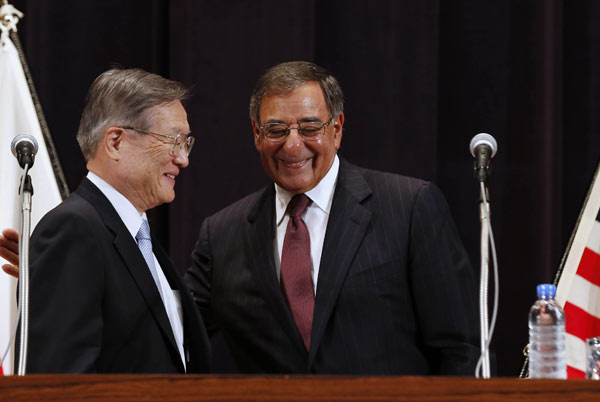
The United States and Japan agreed on Monday to put a second missile defense system in Japan to protect the country from the threat of missile attacks, a move that has raised Chinese concerns.
 |
|
US Secretary of Defense Leon Panetta (right) and Japan's Minister of Defense Satoshi Morimoto smile at the end of a joint news conference at the Ministry of Defense in Tokyo, on Monday. Panetta is on the first official stop of a three-nation tour to Japan, China and New Zealand. Larry Downing / Reuters |
Analysts said the system can reach as far as the Democratic People's Republic of Korea and China.
Citing Japanese officials, The Associated Press reported that the radar installation will be somewhere in the south of Japan, but not Okinawa. The exact location has not yet been determined.
The US has similar early warning radar systems on ships in the Asia-Pacific, and this second Japan-based system will allow US vessels to spread out and cover other parts of the Asia-Pacific region, said AP.
Liu Jiangyong, an expert on Japanese studies and the deputy dean of the Institute of Modern International Relations at Tsinghua University, said the capability of the defense system has shown that the DPRK is not its only target as US and Japanese officials have claimed.
US Defense Secretary Leon Panetta and Japanese officials have insisted that the radar system will not aim at China.
The system "will enhance the alliance's ability to defend Japan, our forward deployed forces and the US homeland from a ballistic missile threat posed by North Korea," Panetta said during a news conference in Tokyo with Japanese Defense Minister Satoshi Morimoto, Reuters reported.
Morimoto said in the meeting with Panetta that it's very important to have an even stronger US-Japan alliance when facing various challenges, according to Japan's Kyodo News.
Ties between China and Japan have been strained by escalating tension caused by their dispute over the Diaoyu Islands.
"The US defense systems in Japan and East Asia have full capability to cover the DPRK and China, not to mention the fact that Japan and the US have repeatedly said that their security treaty covers the Diaoyu Islands," said Lui, adding that "All of these show that one of the new defense system's aims is to target China."
Panetta and Japanese officials also discussed the deployment of V-22 Ospreys in Futenma, and the two sides decided to speed up the search for ways to ensure safety, reported Kyodo. Thousands of people have protested against the hybrid aircraft's planned use, saying they are unsafe.
After a meeting with Panetta, Japanese Minister of Foreign Affairs Koichiro Gemba said the two countries have a consensus that the Diaoyu Islands fall within the scope of the 1960 US-Japan Treaty of Mutual Cooperation and Security, under which Washington will provide assistance to Tokyo when territories under Japan's administration come under armed attack, Hong Kong-based Phoenix Television reported.
Chinese Foreign Ministry spokesman Hong Lei told a regular news conference on Monday that China hopes the US sticks to an impartial stance in the dispute over the islands.
To prevent the tense situation from further escalating, the US government should take responsibility for reining in its unruly allies in the region, including Japan, said a commentary by Xinhua News Agency.
"Washington should discourage Japan's provocations and rectify its own wrong position of applying the US-Japan security treaty to China's Diaoyu Islands in the East China Sea," it said.
Contact the writers at chengguangjin@chinadaily.com.cn and wangchenyan@chinadaily.com.cn